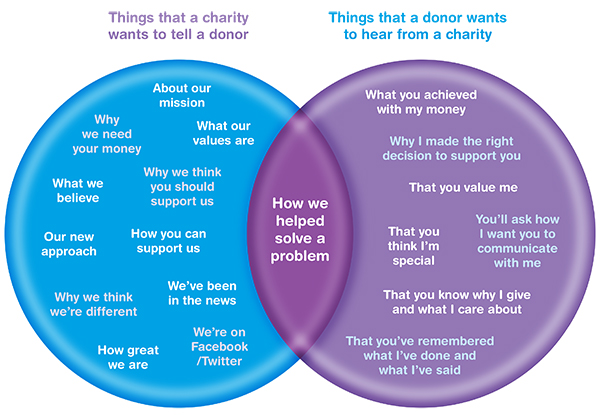
Almost every day I kindly interrupt a conversation and ask: “what’s the problem?” The conversation could be about a drywall situation in a new house, dealing with an unruly child, a banking problem or, bringing it to our fundraising world, how to manage a major donor.
I was in a board meeting recently where one person was going on and on about process, the basis for the argument, the underlying values, and a host of other relevant but unnecessary details. But he was missing the fact that the audience had not quite grasped what the problem or situation was. So I carefully interrupted and said: “So, what is the point you are getting at?” And the person stated the point, and everyone in the room noticeably sighed “ahhhhh” – you could tell that they got it.
It is so easy to get off the main point in major gifts: donors want to solve a problem. THAT is why they give. They also want some other things which Mark Phillips, CEO and Founder of Bullfrog (in the UK) has so brilliantly depicted in the graphic at the top of this blog (click here for a larger version of this graphic).
Left to our own devices, we will talk about ourselves, our process, how great we are, why we are different… and on and on, never realizing that the donor does not really care about all of that. They care about two fundamental things:
- That their giving is making a difference – that they are helping to solve a real problem.
- How they are being treated – this is all about respect, care, and treating a donor as a partner in solving the problem, rather than treating them as a source of cash.
Tomorrow is Thanksgiving in the United States – a holiday when most folks, in addition to eating a ton of turkey and an assortment of pies, pause and take measure of how blessed and thankful they are for all the good in their lives.
Believe me when I say that you and your organization will be present in your donor’s thoughts tomorrow. Here’s why. If you have uncovered the donor’s interests and passions and are faithfully and energetically serving the donor to fulfill them through your organization, you are creating a situation where the donor is actively working out what they want to do in our hurting world through you. And because they hold that problem-solving activity so close to their hearts, they will be thankful for the good that is happening because of you.
It is an amazing thing. That is why Jeff and I love this work. It is so motivating to know that, as a result of what we do in major gifts, there are hundreds of thousands of donors around the world that are personally finding fulfillment by giving to what they care about.
And if you are a fundraising professional in any other part of the world (we have a lot of readers outside of the USA), all of this is true for you as well. While you may not celebrate Thanksgiving in your country, your donors, properly treated, are continually thankful for what they are able to accomplish through their giving.
Please do two things with this information:
- Give yourself a gift of appreciation for the good you have done in each of your donors’ lives. Because of you, a donor is finding true purpose and fulfillment in a very important area of her life – that of helping others.
- Audit all of your communication to be sure that your messaging is about what the donor cares about. Remember that we, the insiders, will always default to what we care about: budgets, process, reputation, etc. Donors do not care about that. They just want to know that their giving has actually done some good and made a difference.
I would print out these two actions and post them near your computer, so you are reminded daily to focus on what is important in your work.
Richard






0 Comments